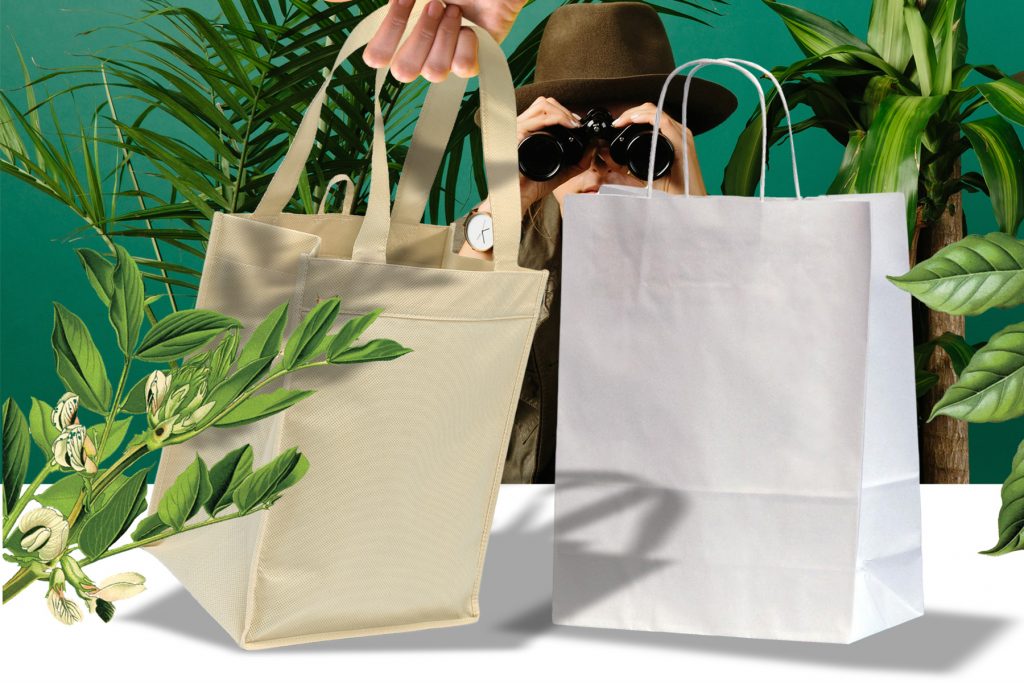Paper, Natural or Non-Woven Bags – Which is better for our environment?

Countries around the world have joined the effort to curb plastic use. In particular, single-use plastic bags. Most Australian states have implemented the plastic bag ban, which has resulted in billions of light-weight plastic bags being kept from landfill and polluting the environment. One grocery chain alone has saved upwards of 5000 tonnes of the problematic plastics.
With these bags out of action, the humble tote bag has risen significantly in the promotional product space. Companies recognise the need for durable and reusable bags. However, they are torn between a traditional paper bag, a natural fibre bag (cotton, jute or bamboo), or a hardy non-woven polypropylene bag.
So which is better for our environment?
Paper
Since the plastic bag ban, many have demanded we return to the way things were done in the past. An image springs to mind – a shopper coming home with their arms filled with paper grocery bags, a baguette sticking out of one and celery out of another.
Modern consumers have questioned the durability of these bags however. We know that any blowout will send those groceries all across the floor. Luckily, paper bags aren’t all flimsy and handle-less. Today’s promotional paper bags are made of tough, 120gsm+ kraft paper with flat or twisted paper, or rope handles.
In terms of the environment, we all know how paper is made; from raw wood, pulped and pressed. As a natural product, paper bags are easily recycled and break down quickly in landfill. However, the production process requires water and energy – more water and energy than plastic. Paper bags are also weightier than plastic and so require more energy to transport.
Paper bag production, even if the wood is sourced responsibly, has a greater environmental impact than plastic. However, paper bags do not threaten the environment when they are discarded.
Natural Fibre
Cotton, jute and bamboo bags are the next favourite plastic alternative for the same reason as paper bags. They’re made from natural, responsibly-sourced, biodegradable fibre. A natural fibre bag is easily washable and will hold just as much, if not more than the single-use plastic bags of the past. It has been said that they can hold upwards of 10kgs!
Between cotton, jute and bamboo, cotton is the least environmentally friendly because of the water and pesticides used in its production. Reports state that to neutralise its environmental footprint, we need to reuse a cotton tote bag 7,100 times.
Jute is the unrefined version of hessian. You may know it as the ‘Golden Fibre.’ Its production requires very little water, pesticides and land. Furthermore, long and strong fibres means a jute tote bag will outlast others, decreasing its footprint even further with each use.
Additionally, for every 100x of these jute tote bags sold, the manufacturer plants a native tree in degraded Australian land. Definitely better for our environment.
Finally, because bamboo is a fast-growing plant, it is an easily sustainable resource. This makes it a perfect material for consumable products like bags. Similarly to jute, bamboo is naturally bacteria resistant and does not require pesticides in its production. It also uses very little water to grow.
Non-Woven
A non-woven bag is made from polypropylene and, because it is not woven, has the same feel as a canvas bag. These are the 99 cent green and red bags available at grocery stores. Non-woven bags can be made from recycled plastic, but you’ll need to reuse it 11 times to nullify the emissions from its manufacture.
Non-woven bags are machine-washable and durable but almost all will take over 1,000 years to breakdown in landfill. The good news is, there is now an independently tested, biodegradable non-woven bag available. Uniquely, it is chemically treated during the manufacturing process to become *biodegradable in microbe rich municipal landfills (*ASTMD5511).
Which Bag Is Better For Our Environment?
This is a question that has been asked since well before the plastic bag bans. Concern for the Earth has turned consumer focus to the way they use plastic and its effects on the environment.
While natural products seem the logical choice for ‘most environmentally friendly’, they aren’t always. The resources used in growing and manufacturing natural products can have a greater impact than those needed for the non-woven polypropylene. However, in terms of what we leave behind, natural products will degrade once discarded, while plastics can be recycled but will not breakdown in our lifetime.
To choose which bag is best, you have to decide what your priority is. Is it reducing your carbon footprint? Or is it protecting our ecosystems and wildlife?
If you have any reducing, reusing or recycling tips, please share by commenting below. Or ask us how we can help you reach your goals.


